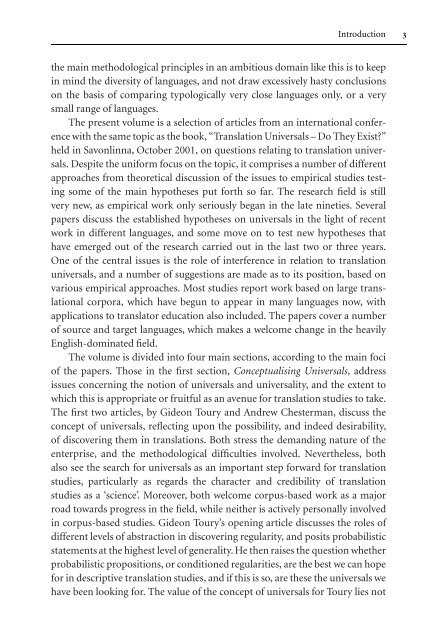Translation Universals.pdf - ymerleksi - home
Translation Universals.pdf - ymerleksi - home
Translation Universals.pdf - ymerleksi - home
You also want an ePaper? Increase the reach of your titles
YUMPU automatically turns print PDFs into web optimized ePapers that Google loves.
Introduction 3<br />
the main methodological principles in an ambitious domain like this is to keep<br />
in mind the diversity of languages, and not draw excessively hasty conclusions<br />
on the basis of comparing typologically very close languages only, or a very<br />
small range of languages.<br />
The present volume is a selection of articles from an international conference<br />
with the same topic as the book, “<strong>Translation</strong> <strong>Universals</strong> – Do They Exist?”<br />
held in Savonlinna, October 2001, on questions relating to translation universals.<br />
Despite the uniform focus on the topic, it comprises a number of different<br />
approaches from theoretical discussion of the issues to empirical studies testing<br />
some of the main hypotheses put forth so far. The research field is still<br />
very new, as empirical work only seriously began in the late nineties. Several<br />
papers discuss the established hypotheses on universals in the light of recent<br />
work in different languages, and some move on to test new hypotheses that<br />
have emerged out of the research carried out in the last two or three years.<br />
One of the central issues is the role of interference in relation to translation<br />
universals, and a number of suggestions are made as to its position, based on<br />
various empirical approaches. Most studies report work based on large translational<br />
corpora, which have begun to appear in many languages now, with<br />
applications to translator education also included. The papers cover a number<br />
of source and target languages, which makes a welcome change in the heavily<br />
English-dominated field.<br />
The volume is divided into four main sections, according to the main foci<br />
of the papers. Those in the first section, Conceptualising <strong>Universals</strong>, address<br />
issues concerning the notion of universals and universality, and the extent to<br />
which this is appropriate or fruitful as an avenue for translation studies to take.<br />
The first two articles, by Gideon Toury and Andrew Chesterman, discuss the<br />
concept of universals, reflecting upon the possibility, and indeed desirability,<br />
of discovering them in translations. Both stress the demanding nature of the<br />
enterprise, and the methodological difficulties involved. Nevertheless, both<br />
also see the search for universals as an important step forward for translation<br />
studies, particularly as regards the character and credibility of translation<br />
studies as a ‘science’. Moreover, both welcome corpus-based work as a major<br />
road towards progress in the field, while neither is actively personally involved<br />
in corpus-based studies. Gideon Toury’s opening article discusses the roles of<br />
different levels of abstraction in discovering regularity, and posits probabilistic<br />
statements at the highest level of generality. He then raises the question whether<br />
probabilistic propositions, or conditioned regularities, are the best we can hope<br />
for in descriptive translation studies, and if this is so, are these the universals we<br />
have been looking for. The value of the concept of universals for Toury lies not
















